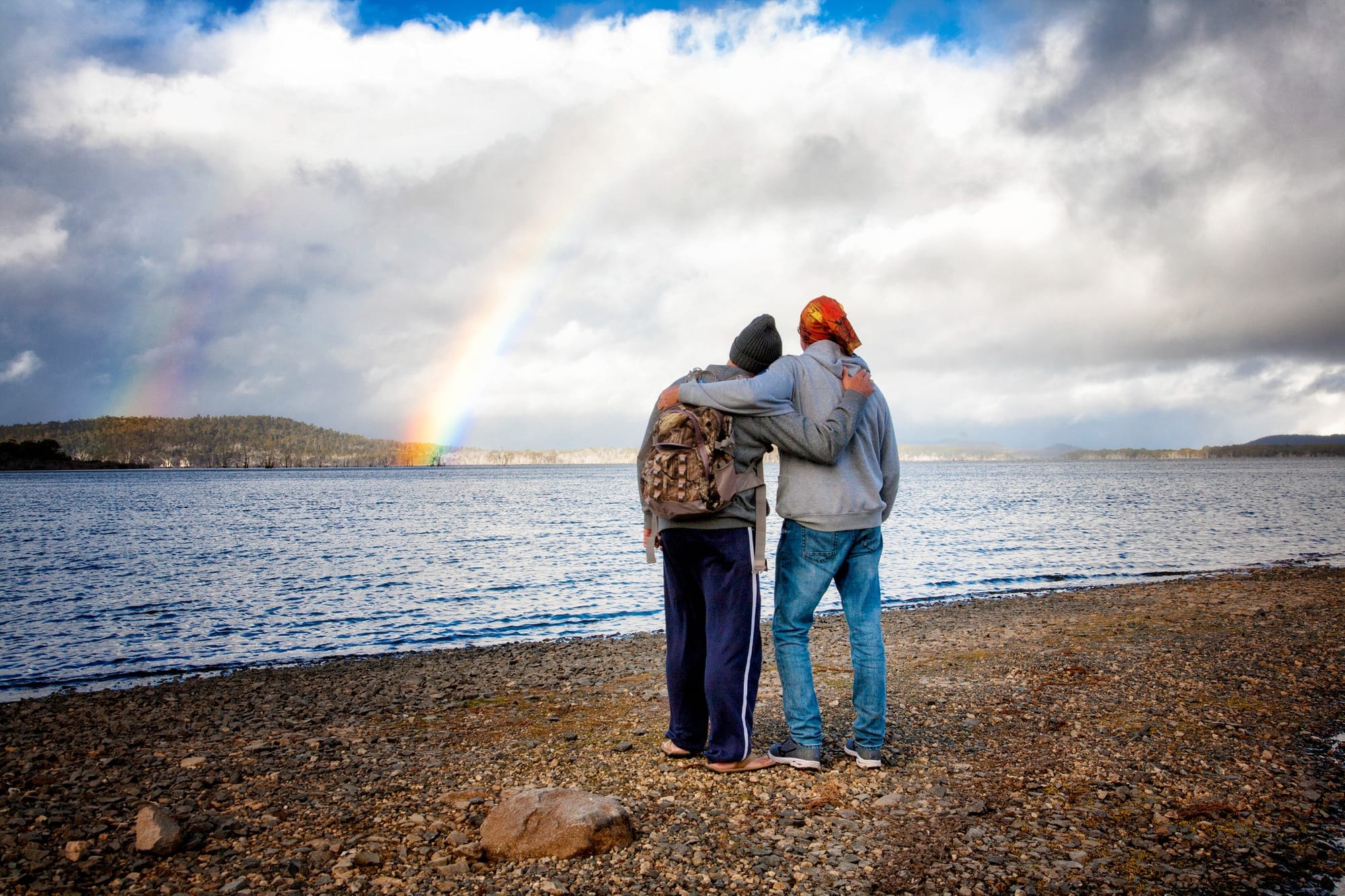
Tasmania has gone from being the last state in Australia to decriminalise homosexuality, to being the first state to offer compensation to those who were subjected to those heinous laws.
With bipartisan support, on 6 November 2025, the Tasmanian parliament passed the Expungement of Historical Offences Amendment Bill 2025, which provides fixed sums of money be paid to persons who were charged or convicted of offences that no longer exist.
Tasmania set to pass redress scheme for historical homosexual convictions. Rodney Croome and Professor Paula Gerber have spoken about the importance of the scheme. https://t.co/gmVKeUzAAE
— OUTinPerth (@OUTinPerth) November 5, 2025
It was only 28 years ago that Tasmania repealed the laws that said men could be imprisoned for up to 21 years for consensual same-sex sexual conduct. And Tasmania was unique among Australian states in also criminalising cross-dressing, a measure that persisted until 2001 and was predominantly used to target transgender women.
These laws were only abolished after sustained legal challenges, including a landmark case in the United Nations (Toonen v Australia), which set a global precedent that criminalising consensual gay sex is a fundamental breach of human rights.
These laws had far-reaching consequences and influenced community attitudes. When a government criminalises LGBTIQA+ people, it sends a message to all of society that it’s OK to discriminate against the rainbow community.
As a proud, out lesbian, I may well have had to sacrifice my career in law and academia had I been born just a few decades earlier. It’s a shameful part of our history, and I’m proud to be helping to achieve justice and reparations for the people most severely impacted by these laws.

Given that Tasmania only decriminalised homosexuality-related offences in 1997 (22 years later than South Australia, which was the first Australian state to decriminalise in 1975, and three decades after the UK!) there are many men – best estimates are about 100 – who are living with the legacy of being charged and/or convicted of engaging in conduct that should never have been criminalised.
The consequences of a having a criminal record are many, and include:
- the inability to secure employment or change jobs because of the risk of prospective employers undertaking criminal record checks and exposing the conviction
- difficulties securing housing due to the lingering effects of the criminal record
- the inability to undertake certain types of volunteer work because of the prospect of not being able to pass the mandatory checks (for example, working with children)
- stigma, shame, humiliation and embarrassment
- discrimination and reputational damage
- self-isolation because of a fear that others will find out you have a criminal record.
These consequences are on top of the immediate harmful impacts of being convicted of these crimes, including having to pay a fine, being fired from their job, being ostracised from family and friends, and being evicted from their home.
For some individuals, the experience of being charged and/or convicted was so traumatic that they felt the need to move to another state or country.
The first step in righting this wrong is to expunge these convictions; to permanently wipe them off an individual’s criminal record.
Advocating for change
As a member of the LGBTIQA+ community, and an international human rights law scholar, I watched with interest as the UK, in 2012, became one of the first countries to remove these convictions from gay men’s criminal records.
I was curious to know whether Australia had done the same. When I discovered we had not, I started advocating for this reform, and was thrilled when, in 2014, Victoria became the first state in Australia to set up a scheme for expunging convictions for conduct that should never have been criminal.
But getting rid of these convictions is just the first step on the journey of healing. Acknowledging and apologising for these wrongs is the second step.
I will never forget sitting in the Victorian parliament in 2016, when Dan Andrews became the first leader in the world to apologise for laws criminalising same-sex conduct. There was not a dry eye in the gallery when he said:
“There was a time in our history when we turned thousands of ordinary young men into criminals … It is the first responsibility of a government to keep people safe. But the government didn’t keep LGBTI people safe. The government invalidated their humanity and cast them into a nightmare.”
I learnt that two women were convicted for offensive behaviour in the 1970s for holding hands – on a tram. So let me finish by saying, if you’re a member of the LGBTI community, and there’s someone in your life that you love – a partner or a friend – then do me a favour. Next time you’re on a tram in Melbourne, hold their hand. Do it with pride and defiance…
On behalf of the parliament, the government and the people of Victoria, for the laws we passed and the lives we ruined, and the standards we set, we are so sorry. Humbly, deeply sorry.
The expungement of convictions and the apology are appropriate and appreciated. But to truly repair the wrongs perpetrated against LGBTQ people, reparations are also necessary, and that is what Tasmania has now done.
I provided expert evidence to the Joint Sessional Committee on Gender and Equality that conducted an inquiry into appropriate compensation. I submitted that the quantum of redress must recognise the economic, as well as the non-economic loss and damage that victims of these laws endured, and must genuinely recognise the harm inflicted by the odious laws that targeted parts of the LGBTIQA+ community.
I considered the purpose of such payments, which are, in part, a way of expressing regret for the wrong done, and going some way to correcting mistakes of the state.
After considering various wrongful conviction compensation payments, and comparing schemes for redress for historic homosexuality-related convictions set up in other countries (Germany, Spain and Canada, among others), I recommended to the Tasmanian government that it identify three distinct classes of people affected by the laws, and pay them three distinct amounts, namely:
- $15,000 to persons who were charged but not convicted and did not serve time in jail
- $45,000 to persons who were convicted, but did not serve any time in jail
- $75,000 to persons who were convicted and were subjected to a penalty, including time in jail or other forms of punishment – for example, conversion practices.
Tasmanians convicted under now-abolished laws against homosexuality and cross-dressing could receive up to $75,000 in a landmark reform package.https://t.co/kHKqEUY2Dz pic.twitter.com/Ac6VxeOGlZ
— Rodney Croome AM (@RodneyCroome) September 24, 2025
The act that has just been passed by Tasmania's parliament adopts precisely these classifications and amounts, and provides that the sums are to be paid automatically upon the expungement of the charge or conviction.
This approach is consistent with international best practice and global human rights standards. The amounts are not tokenistic and represent a genuine recognition of the harm inflicted by Tasmania’s historical laws targeting men who engaged in consensual same-sex sexual conduct or cross-dressing.
This reform marks a significant human rights milestone, rectifying decades of statutory discrimination and harsh criminal sanctions against LGBTQ+ individuals in Tasmania.
It’s now time for all other Australian states and territories to follow Tasmania’s lead and implement similar schemes of redress.
Victoria was the first state to apologise for the laws that embed prejudice against LGBTIQA+ people. It should now finish the job and be the second state to provide meaningful reparations for those historic wrongs.
Only by taking such steps can we, as a society, truly recognise the harm caused by past injustices, confront and acknowledge these wrongs, and move forward together with greater understanding and a renewed commitment to justice for all LGBTIQA+ people.





